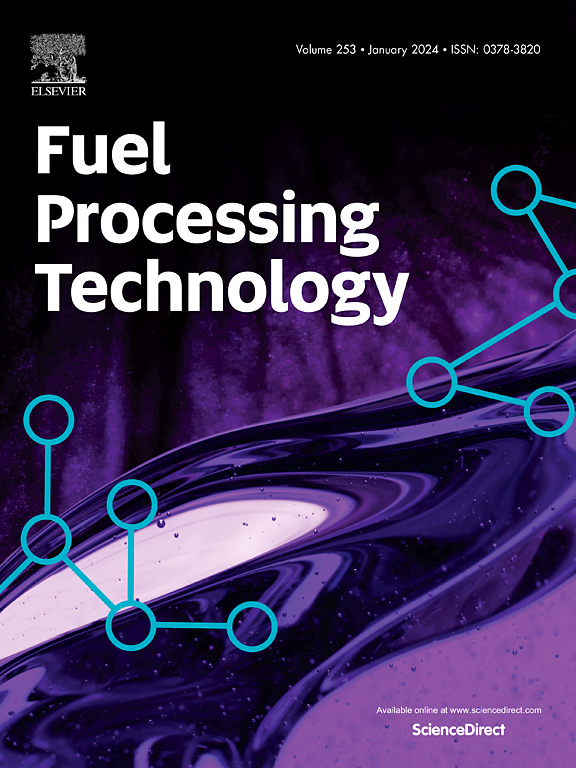Repurposing of propane oxidative-dehydrogenation catalysts to deoxygenation of vegetable oils for green diesel production
IF 7.2
2区 工程技术
Q1 CHEMISTRY, APPLIED
引用次数: 0
Abstract
The market for diesel fuel will grow in the next years. Green diesel – alkanes produced through deoxygenation (DO) with H2 of triglyceride-based biomasses – can help cover this demand sustainably. Repurposing non-noble-metals catalysts is a faster affordable route to spread DO at larger scales. NiCoMo and ZnCoMo catalysts were previously proposed in the literature for oxidative-dehydrogenation of propane and unprecedentedly repurposed for DO in this work. DO tests on NiCoMo and ZnCoMo were performed according to an unreplicated 23 factorial Design of Experiment (DoE) with three replications at center point. Temperature (T), catalyst-to-oil ratio (γ), DO duration (t) were the design-factors, at levels: 280–320 °C; 4–10 %w/w; 2–6 h. Both catalysts performed promisingly(NiCoMo and ZnCoMo best conversion of 100 %, NiCoMo and ZnCoMo best diesel yields of 73 % and 68 %, respectively). Analysis of Variance was performed on main effects and factor interactions of all measured quantities and performance parameters, obtaining surface responses equations. Additionally, NiCoMo and ZnCoMo underwent recycling tests (four DO cycles) to evaluate reusability at 320 °C-10 %w/w-2 h: catalysts ensured for four cycles stable 100 % conversion of triglycerides and slightly growing diesel yield (NiCoMo: 67 % to 72 %; ZnCoMo: 64 % to 74 %). Overall, the selected dehydrogenation catalysts were successfully repurposed for DO at laboratory-scale. Although further evaluations should be performed for a balanced perspective regarding the industrial potential and sustainability of DO by repurposed NiCoMo and ZnCoMo (e.g., catalyst synthesis scalability, switch from batch to continuous production), the ease (cost-effectiveness) of the catalytic synthesis and process performances seem promising for their scalability.
丙烷氧化脱氢催化剂在绿色柴油生产中的应用
未来几年柴油市场将会增长。绿色柴油——通过甘油三酯基生物质的H2脱氧(DO)产生的烷烃——可以帮助可持续地满足这一需求。重新利用非贵金属催化剂是在更大范围内扩散DO的一种更快、更经济的途径。NiCoMo和ZnCoMo催化剂在之前的文献中被提出用于丙烷的氧化脱氢,并且在这项工作中前所未有地重新用于DO。NiCoMo和ZnCoMo的DO试验采用无重复23因子试验设计(DoE),中心点为3个重复。温度(T),催化剂油比(γ), DO持续时间(T)是设计因素,水平为280-320℃;4到10 % w / w;两种催化剂均表现良好(NiCoMo和ZnCoMo的最佳转化率为100%,NiCoMo和ZnCoMo的最佳柴油收率分别为73%和68%)。对所有测量量和性能参数的主效应和因子交互作用进行方差分析,得到表面响应方程。此外,NiCoMo和ZnCoMo进行了循环测试(4次DO循环),以评估在320°c - 10% w/w-2 h下的可重复使用性:催化剂确保了4次循环中甘油三酯转化率稳定在100%,柴油收率略有提高(NiCoMo: 67%至72%;ZnCoMo: 64%至74%)。总的来说,所选的脱氢催化剂在实验室规模上成功地重新用于DO。虽然需要对NiCoMo和ZnCoMo的工业潜力和可持续性进行进一步的评估(例如,催化剂合成的可扩展性,从批量生产切换到连续生产),但催化合成的便利性(成本效益)和工艺性能似乎很有希望实现可扩展性。
本文章由计算机程序翻译,如有差异,请以英文原文为准。
求助全文
约1分钟内获得全文
求助全文
来源期刊

Fuel Processing Technology
工程技术-工程:化工
CiteScore
13.20
自引率
9.30%
发文量
398
审稿时长
26 days
期刊介绍:
Fuel Processing Technology (FPT) deals with the scientific and technological aspects of converting fossil and renewable resources to clean fuels, value-added chemicals, fuel-related advanced carbon materials and by-products. In addition to the traditional non-nuclear fossil fuels, biomass and wastes, papers on the integration of renewables such as solar and wind energy and energy storage into the fuel processing processes, as well as papers on the production and conversion of non-carbon-containing fuels such as hydrogen and ammonia, are also welcome. While chemical conversion is emphasized, papers on advanced physical conversion processes are also considered for publication in FPT. Papers on the fundamental aspects of fuel structure and properties will also be considered.
 求助内容:
求助内容: 应助结果提醒方式:
应助结果提醒方式:


